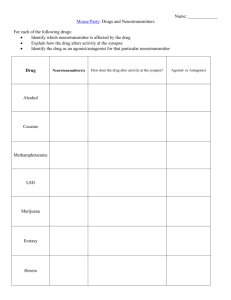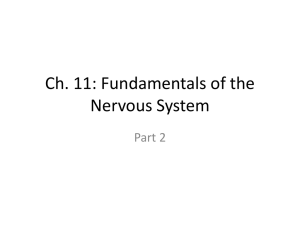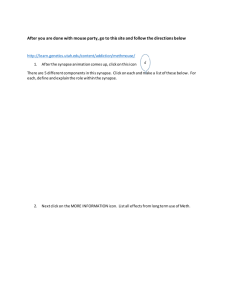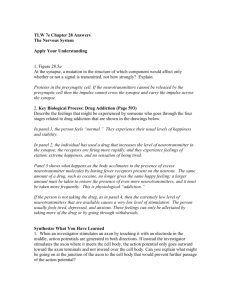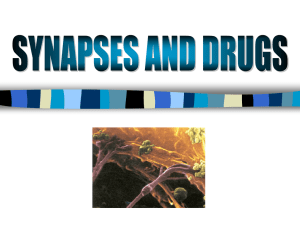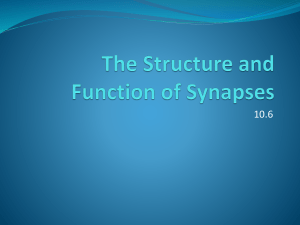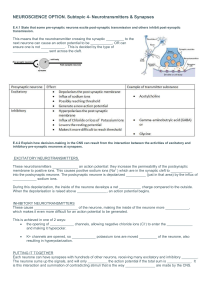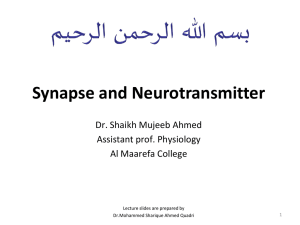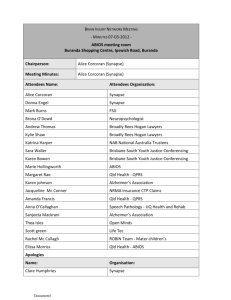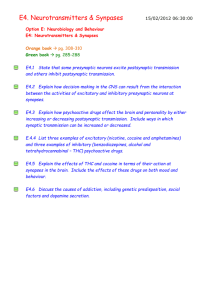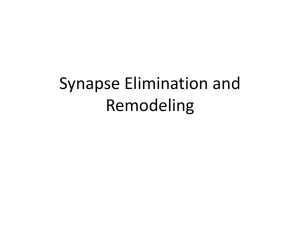File
advertisement
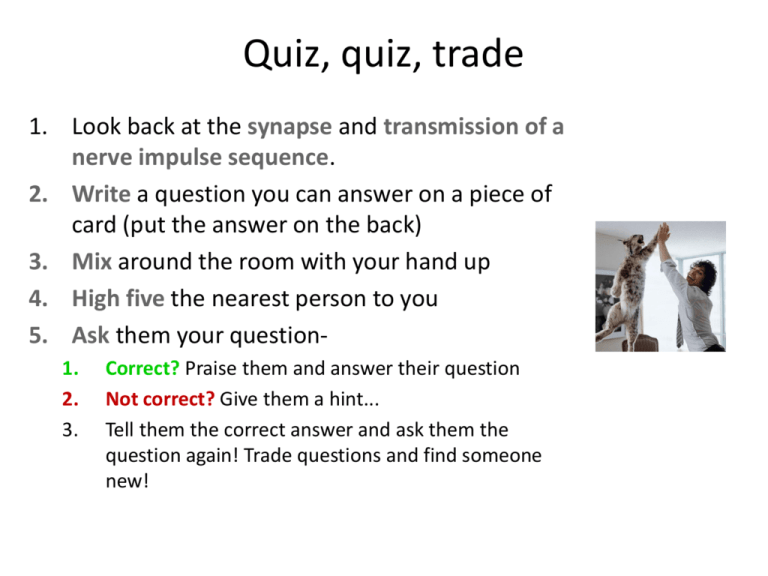
Quiz, quiz, trade 1. Look back at the synapse and transmission of a nerve impulse sequence. 2. Write a question you can answer on a piece of card (put the answer on the back) 3. Mix around the room with your hand up 4. High five the nearest person to you 5. Ask them your question1. 2. 3. Correct? Praise them and answer their question Not correct? Give them a hint... Tell them the correct answer and ask them the question again! Trade questions and find someone new! Drugs and synapses WAL: An overview of the synapse •How is information Some transmitted across a synapse? •What functions do synapses Most perform? All •What is a synapse? Starter – Quiz, quiz, trade Write down a question and answer about the topic. Today we are covering from the specification: Pages 177-179 of your textbook Missing Words diffuse bind electrical impulse neurotransmitters axon neurone 1) An ________ impulse travels along an ________. 2) This triggers the nerve-ending of a neurone to release chemical messengers called ______________. 3) These chemicals __________ across the synapse (the gap) and __________ with receptor molecules on the membrane of the next neurone. 4) The receptors on the second ________ bind only to the specific chemicals released from the first neuron. This stimulates the second neuron to transmit the electrical _________. Neurotransmitters • The process of information transmission we’ve looked is an example of a Cholinergic synapse • i.e. Acetylcholine neurotransmitter • Acetylcholine acts as an excitatory neurotransmitter at synapses connecting motor neurones with skeletal muscle= Neuromuscular junction Neuromuscular Junctions • Same stages as cholinergic synapses, • But in this case the postsynaptic membrane is the muscle fibre membrane, (Sarcolemma). • Neurotransmitter and sodium ions leads to depolarisation of the sarcolemma. • Which leads to contraction of muscle fibre. Neurotransmitters • There are dozens of different neurotransmitters (NT) in the neurons of the body. • NTs can be either excitatory or inhibitory • Each neuron generally synthesizes and releases a single type of neurotransmitter • The major neurotransmitters are indicated on the next slide. There are more types of neurotransmitter than just acetylcholine... Table of neurotransmitters • • • • • • • Dopamine GABA Serotonin Acetylcholine Glycine Norepineprine Dopamine Drugs Interfere with Neurotranmission • Drugs can affect synapses at a variety of sites and in a variety of ways. • Look at the structure of the synapse and sequence of events across a synapse. • What ways can you identify how drugs might affect synaptic transmission? Drugs interfere with neurotransmission 1. Increasing number of impulses 2. Release NT from vesicles with or without impulses 3. Block reuptake or block receptors 4. Produce more or less NT 5. Prevent vesicles from releasing NT Drugs (of many) which affect Neurotransmission • • • • LSD Cocaine Marijuana Nicotine Various effects of drugs on synapses: DRUG ACTION EFFECT Mimic a neurotransmitter Switch on a synapse Stimulate the release of a neurotransmitter Switch on a synapse Open a neuroreceptor (protein) channel Switch on a synapse Block a neuroreceptor (protein) channel Switch off a synapse Inhibit the breakdown enzyme Switch on a synapse Block the Na+ or K+ channels Stop action potentials Drugs • Drugs that stimulate a nervous system are called AGONISTS • Drugs that inhibit a nervous system are called ANTAGONISTS. • http://outreach.mcb.harvard.edu/animations/synap se.swf Neurotransmitters http://www.vuutv.info/8ae947a3d8:sPLTLhWcgSo.ht ml Watch this video and answer the questions: • What substance did the scientist find that was affected by the drug chlorpromazine? • What condition has dopamine been linked to? • What condition has serotonin been linked to? • What condition has acetylcholine been linked to? Drugs and synapses WAL: An overview of the synapse •How is information Some transmitted across a synapse? •What functions do synapses Most perform? All •What is a synapse? Plenary– Mind map Glossary • • • • • • • • Synapse Synaptic knob Synaptic cleft Synaptic vesicle Neurotransmitter Concentration gradient Pre-synaptic neurone Post-synaptic neurone Glossary • • • • • • • • Synapse- junction between two neurones Synaptic knob- end of an axon, bulbous Synaptic cleft- gap between neurones/target cell Synaptic vesicle- membrane bound structures containing neurotransmitter substances. Neurotransmitter- hormone like substance that is released from pre-synaptic neurone and diffuses across to post-synaptic neurone/target cell Concentration gradient- caused by differences in a substances concentration Pre-synaptic neurone- neurone sending the impulse Post-synaptic neurone- neurone receiving the impulse
